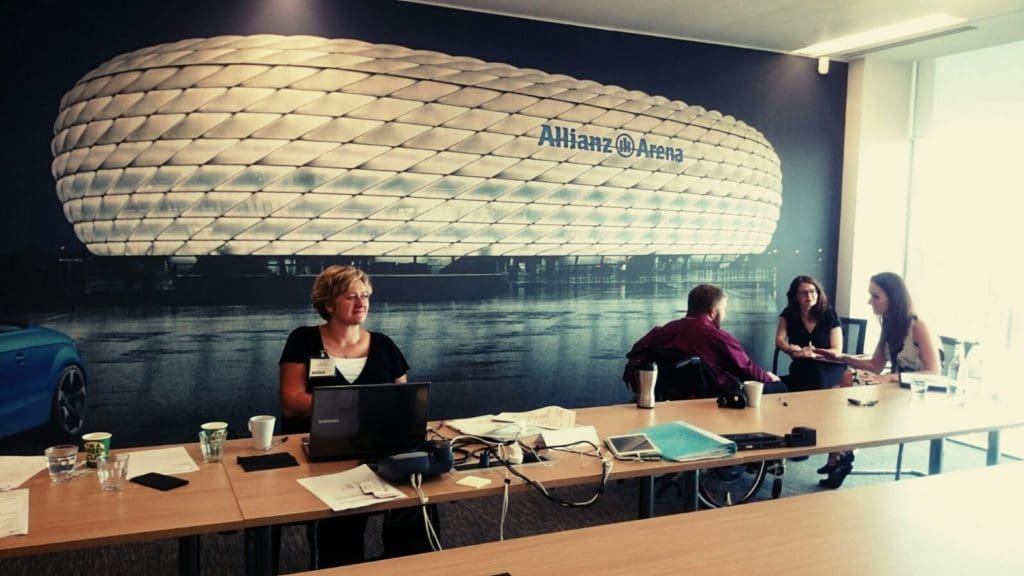Becky Hill Q & A: Back Up To Work
5 October 2016

This month, we’re discussing employment issues for people with a spinal cord injury. In this Q & A our Chair of Trustees, Becky Hill, discusses the Back Up To Work course, her own career and the support that is available for people considering a return to work.
How did you first become involved with Back Up?
My first contact with Back Up was in the early 90s following my injury. I was a participant on a water skiing course, and then I went on to do skiing too. I stayed in touch with Back Up after that, doing fundraising events and I became a mentor and group leader. I even became a trustee of the charity in 2001 and am now currently the Chair of Trustees. I started to help facilitate the Back Up To Work course a couple of years ago.
How did the Back Up To Work course came about?
Helen Cooke approached Back Up with the idea. Helen, who is spinal cord injured herself, runs her own disability and employment consultancy. We’d had discussions about employment services and we were very much aware that a large number of people we were seeing were not returning to work. We had our first course over 10 years ago in Canary Wharf. We were hosted by the Lehman Brothers and I was the group leader. As we’ve expanded the course over the years, I started to help facilitate so that Helen and I alternate it now between us. The courses are still hosted by our generous corporate partners, such as Allianz and KPMG, whose staff volunteer to carry out speed interviews with each of the course participants.
Why are courses like Back Up To Work so important today?
I think a lot of people will need to go back to work for financial reasons. But, for me, that’s not the be all and end all of working. There are so many other benefits that are overlooked. It gives you a chance to be sociable, a sense of self-worth and purpose – a reason to get out of bed in the morning that drives you. There’s a lot of research about the other health benefits of gainful employment too. I also think that people sometimes find it hard physically and mentally to return to work following injury. They might also have to retrain because they can’t go back to their previous job and so they need additional support and assistance. The course is important as it gives people the skills and techniques to either return to work or find another job as well as the confidence to do so.
How has your disability affected your career?
I have never felt that my disability ever got in the way during my career. It was never a focus or real consideration. I think I did stand out though because I was the girl in the chair. But I believe it can have positive ramifications because some of the barriers you see can be overcome and reasonable adjustments put in place. There’s no reason why you can’t hold down a career alongside your non-disabled counterparts. That was the certainly the case when I worked at BT. They were positive about employing disabled people and my disability was never a consideration there. The only times it was considered was when we were going to meetings out of the office and I would sort that out myself, ensuring access wasn’t an issue.
Do you think that employers’ perceptions of disability have changed?
I think there’s much more awareness and buildings are generally more accessible. Issues like that are less of a hurdle now for people with a spinal with a spinal cord injury. I think some of the more sensitive aspects of disability may need explaining a bit more. You might need to adjust your working hours if you can’t make it in for an early start because of your routine. Things like that are perhaps less understood, but easily put in place with a bit of understanding. And generally people are open to making those changes nowadays.
A lot of people with a spinal cord injury feel they lack the support and encouragement to get back into work. What would you say to them?
I would say that there is support there, such as the Back Up To Work course. I would recommend that they come along and gain some insights about how to approach returning to work and gaining the confidence to do so. In addition, with the introduction of new MASCIP’s guidelines on vocational rehabilitation, there will be an increasing amount of support at an early stage after your injury. It’s really important to begin a dialogue early in your rehabilitation about working again. It is possible, it is doable and it’s something you can definitely aim towards.
If you’d like to attend our Back Up To Work course in London March 7-9 2017, apply online or email Andy (andy@backuptrust.org.uk)

